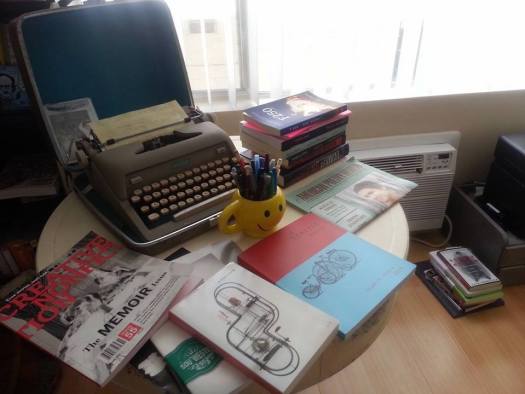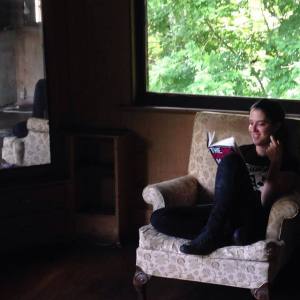 Molly Sutton Kiefer, is an essayist and poet with numerous publications including the lyric essay, Nestuary (Ricochet Editions 2014) and two chapbooks. She edited for dislocate and Midway Journal before co-founding Tinderbox Poetry Journal with her friend, Brett Elizabeth Jenkins. She is now happily tackling the role of publisher for her newest project, Tinderbox Editions. In a submission call I picked up through the yahoo! listserv CRWROPPS (Creative Writing Opportunities List), Kiefer announced Tinderbox Editions’ latest open reading period will have a fee-free option until August 31st. As a poet who struggles with innumerable pay-to-play contests and open readings, I was excited to learn about reading fees from the publisher’s perspective and to hear more on running a journal and press. Here is what she had to share.
Molly Sutton Kiefer, is an essayist and poet with numerous publications including the lyric essay, Nestuary (Ricochet Editions 2014) and two chapbooks. She edited for dislocate and Midway Journal before co-founding Tinderbox Poetry Journal with her friend, Brett Elizabeth Jenkins. She is now happily tackling the role of publisher for her newest project, Tinderbox Editions. In a submission call I picked up through the yahoo! listserv CRWROPPS (Creative Writing Opportunities List), Kiefer announced Tinderbox Editions’ latest open reading period will have a fee-free option until August 31st. As a poet who struggles with innumerable pay-to-play contests and open readings, I was excited to learn about reading fees from the publisher’s perspective and to hear more on running a journal and press. Here is what she had to share.
by Xochitl-Julisa Bermejo
WOMEN WHO SUBMIT: In Tinderbox’s most recent submission call, it stated, “Due to an enlightening conversation in a private Facebook group, I’ve decided to open up submissions to my press, Tinderbox Editions, with a donation or fee-free option.” What point or comment from this private conversation inspired you to take action?
MOLLY SUTTON KIEFER: It was definitely the moment when, I think it was Margaret Bashaar of Hyacinth Girl Press, reminded us that the fee is prohibitive for some writers, and she mentioned that the poetry world can be classist in this way. In another thread, another smart editor pointed out how when people who have to relinquish a certain amount of money, it brings them closer to making absolutely certain they are sending out the tightest manuscript they can. I think both points are valid.
I might have to rethink our model as we grow, and that’s OK. Running a press is an adaptable experience. But for the time being, I don’t want to limit the manuscripts I read and consider to those I have a connection to or those who can afford to pay out the fee.
WWS: In offering a fee-free option, what are you hoping to achieve with your submission call?
MSK: What I’m seeing already is a wide range of manuscripts—that diversity of style and voice is so important to me. I’m mostly hoping the fee-free means we’re opening to those who might not otherwise be able to send out that book, but [I] also [hope it] will turn up some manuscripts that are taking more chances.
And I hope that those who can donate, do. Every time I pay a fee to a contest, I do think of it as a donation to said press, but I know that isn’t the case for everyone.
WWS: Do you think it will change the amount or quality of work you will see?
MSK: It’s our first open reading period, so it’s hard to tell! I know a lot of the bigger contests average in the hundreds, and we’ve already seen fourteen in the week that we’ve been open. Fortunately, I was able to gather a team of four volunteers to help with the reading of the manuscripts, which I think is important for the slush—this gives the book a better chance of having a champion who might point out something I missed. I’m reading everything, though, so everything will be considered carefully from that final editorial perspective.
At the journal, it’s become important to me to always have open reading. I am so greedy for good poems, I hate to imagine turning some talent away because we are closed.
WWS: In “The Persistence of Litmags”—an article published in The New Yorker last week—Stephen Burt details the hardships of putting together a litmag such as no money, the hours are terrible, and you’ll never get famous. Yet people continue do it. Why? What drove you to start Tinderbox Poetry Journal and now Tinderbox Editions?
MSK: Brett Elizabeth Jenkins and I set out to start [Tinderbox Poetry Journal] a year and a half ago. We were both editing poetry at other mags that combined CNF and fiction and sometimes art with poems, and both of us loved the work. I wanted to start something though, I wanted it to feel more like mine, more of a connection to my own aesthetic, or formation and evolution thereof, and I wanted a partner in this enterprise, so I asked [Brett]—one of my poet-friends with the keenest eye and biggest drive—and TPJ was formed.
I love the editorial process so much; I discovered I was a unique bird when I told others how much I enjoyed the slush. I love finding a beautiful poem and championing it!
I started Tinderbox Editions separate from Brett. What I’ve found as I’ve been working on these books with these stellar poets, and one essayist, and as I’ve begun collecting for a lyric essay anthology…is that I want to publish the work I have a slight bit of envy for…This isn’t the destructive sort of envy, but a woah kind of admiration and desire. If I can’t have written the piece or the book myself, then I want to do all the work I can in finding it a home in this world and getting it as many readers as I can. In many ways, becoming a book publisher has allowed me to hide behind a mask of legitimacy, when I’m really just a fangirl!
WWS: Stephen Burt writes, “Still, having a crack production team, elegant pages, and a balanced budget isn’t enough to get those sentences in front of readers: for a literary journal to succeed…you have to do something that hasn’t been done well before.” What makes TPJ and Tinderbox Editions different or special?
MSK: I want Tinderbox, both journal and press, to give home to work that expands the definition of poetry, to build on the community of readers, to be transparent in our process, to be supportive of our writers, to be the kind of home many, many people would love to see their own work live in. [The press is] so new, we haven’t even put the sign up on the office door, but I think publishing books in the poetry world can be a ping pong game, and I admire the presses like Graywolf, Milkweed, Copper Canyon, etc., who stick by their authors and bring out book after book, supporting the career of the writer, as opposed to this one fleeting moment in their stardom.
I have grand plans for this, like finding a way to include a grant from Tinderbox Editions offered to its poets and essayists who might need some funding help on the next book. I hope to find ways to help fund a reading tour and ways to creatively spread the world about their newest book.
I’m banking on quality and dedication to keep us going…and earnest desire to do right by the people whose work I am helping bring into the world.
WWS: Tinderbox Editions is currently open to submissions until August 31st for “personal essays, lyric essays, prose poem collections, and hybrid collections.” What are you hoping to see? What gets you excited?
MSK: Oh, I am giddy about this reading period. (To be fair, I’ll be giddy about the winter poetry reading period too. I’ve found a way to make my childhood dream come true, which is to become a professional reader). I did my undergraduate thesis in non-fiction and my MFA in poetry. I’ve been pulled between both genres like taffy, and I love that stretch in between. I am ridiculously swoony over personal essayists such as Leslie Jamison, Jo Ann Beard, the like, and those that creep towards lyric essay like Eula Biss and Joni Tevis and those that are more into the poetry end of things like Claudia Rankine and Maggie Nelson. I love Gretel Erlich and Lidia Yukinovitch. I love so many books that are in this nebulous category: Rachel Zucker’s MOTHERs, Christine Hume’s Ventifacts, Bhanu Kapil’s Humanimal, Sarah Vap’s End of the Sentimental Journey. Poets who have written memoir that is also rooted in research and essay: Sarah Manguso’s Two Kinds of Decay and Christine Montross’ Body of Work.
I love the possibilities in this call. I love the ways the written word can interact with art object and artifact, can explore established form and break apart expectations.
WWS: As an editor and publisher, what is the biggest mistake you see from submitters? Or what is your biggest pet peeve?
MSK: There has been one thing that makes my nose wrinkle, and that’s the very small handful of submissions that have read “Dear Sirs.” We’re all ladies. Not on purpose, but by default. Both editors, our journal reader, and the four press readers. (And our first four poets are female, but we have nabbed a book of essays by a very talented male.)
I’m grateful to every submitter who tells me they’ve read a recent issue or admire one of our writers’ work—it tells me that there’s an exchange going on. Spreading the word! I have a feature I’m starting on the press’s blog where people can share something wonderful they’ve read (you can submit at our Submittable page) and that becomes a part of literary citizenship too: here’s this beautiful thing and I want to share it with you.
WWS: Finally, what is one piece of advice you would like to share with women submitting their work for publication?
MSK: You know, one of the best things I did for myself as a writer was to become a reviewer. I did it more in earnest when my first full-length came out—if I expected others to review my work, then I ought to pay it forward in some way. But by reviewing books, particularly ones that are difficult or aren’t in your own writing wheelhouse, strengthens you a great deal, not just to make you a smarter reader and allow you to appreciate you more, but lets you take your own risks in your own work. You never know what will appeal to you. My first review ever was Sun Yung Shin’s Skirt Full of Black for CutBank. I remember getting the book, opening it up, and thinking, “I’ll never have anything smart to say about this!” But I read it to the end and fell in love and read it again and again—with a book and a style I might not have otherwise been open to.
If you believe in yourself and your work and you keep at it (and keep reading—I can’t emphasize that enough!), things will happen.
Xochitl-Julisa Bermejo has work most recently published in The American Poetry Review, The Nervous Breakdown, and Lunch Ticket. She is a co-founding member of Women Who Submit.



